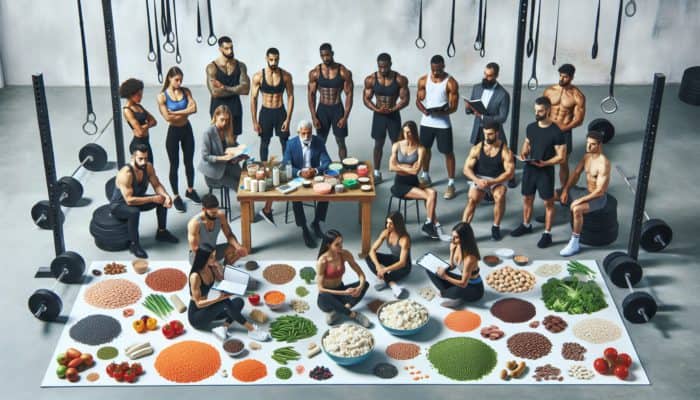Maximize Muscle Growth: The Vital Importance of Protein for Vegetarian Lifters
Exploring Diverse Plant-Based Protein Sources for Optimal Nutrition
Protein plays an essential role in muscle development and recovery, particularly for vegetarian lifters who depend on plant-based proteins for their nutritional needs. Key sources of these proteins encompass soy, legumes, and grains, each presenting unique advantages. For example, soy products such as tofu and tempeh are complete proteins, providing all the essential amino acids necessary for efficient muscle repair. Furthermore, legumes like lentils and chickpeas are not only rich in protein but also packed with fiber, promoting digestive health and enhancing satiety. Grains like quinoa and brown rice deliver essential carbohydrates that sustain energy levels during workouts, contributing to overall protein intake.
By strategically combining various plant-based protein sources, individuals can create a well-rounded amino acid profile, which is crucial for optimal muscle synthesis. It is beneficial for vegetarian lifters to recognize the extensive range of protein sources at their disposal, empowering them to customize their dietary strategies effectively. Incorporating a diverse spectrum of these proteins into their meals enables individuals to meet their protein requirements while also addressing other nutritional needs, such as obtaining vital vitamins and minerals.
Calculating Your Daily Protein Needs for Effective Muscle Growth
Establishing the correct protein intake is crucial for vegetarian lifters who aim to enhance muscle growth. Typically, the recommended daily protein intake ranges from 1.6 to 2.2 grams of protein per kilogram of body weight. This span can differ based on personal factors such as body composition, activity levels, and specific fitness targets. For instance, an individual weighing 70 kg (154 lb) aiming to increase muscle mass would ideally target a daily protein intake of approximately 112-154 g of protein.
To accurately assess protein needs, it is critical to consider factors such as training intensity and overall health goals. Individuals engaged in intense workouts or resistance training may require protein intake closer to the upper end of this range. Utilizing meal-tracking applications or maintaining a food diary can aid individuals in effectively monitoring their protein intake, ensuring they stay aligned with their protein goals.
Combining Foods for a Complete Protein Profile from Plant Sources
Achieving a complete protein profile through plant-based sources often necessitates strategic food combinations. Specific plant-based foods, when paired, can deliver all the essential amino acids needed for muscle repair and growth. For instance, combining rice and beans creates a nutritious complete protein that is both satisfying and nourishing. Additionally, pairing hummus with whole-grain pita offers a rich source of plant protein along with beneficial carbohydrates. Other powerful combinations include:
- Peanut butter on whole-grain bread
- Lentils with quinoa
- Chickpeas with brown rice
- Tofu stir-fry with mixed vegetables and whole grain noodles
- Seeds and nuts mixed with oatmeal
These combinations not only augment protein intake but also encourage a diverse, nutrient-dense diet. By carefully planning meals around these pairings, vegetarian lifters can effectively fulfill their protein requirements while enjoying a wide array of delicious food options.
Expert Insights on Protein Requirements for Vegetarian Lifters

Identifying the Most Effective Protein Sources for Vegetarians
For vegetarian lifters, pinpointing high-quality protein sources is imperative for muscle development and overall health. Some of the most protein-rich vegetarian foods include tofu, tempeh, lentils, and quinoa. Each of these foods provides substantial amounts of protein along with vital nutrients. Tofu, derived from soybeans, is remarkably versatile and can be utilized in a variety of dishes, offering approximately 8 grams of protein per 100 grams. Meanwhile, tempeh, a fermented soy product, boasts an even greater protein content of about 19 grams per 100 grams, in addition to probiotics that contribute to gut health.
Furthermore, other commendable sources of plant-based protein include:
- Lentils: Approximately 9 grams of protein per 100 grams
- Chickpeas: Roughly 8 grams of protein per 100 grams
- Quinoa: Provides 4 grams of protein per 100 grams and is recognized as a complete protein
- Hemp seeds: Deliver approximately 32 grams of protein per 100 grams
- Peas: Contain around 5 grams of protein per 100 grams
Incorporating these protein sources into daily meals can significantly elevate a vegetarian lifter’s overall protein intake, thereby supporting muscle growth and recovery.
Enhancing Protein Absorption for Optimal Muscle Development
Maximizing protein absorption is crucial for vegetarian lifters looking to optimize their muscle-building potential. Consuming proteins alongside foods rich in vitamins and minerals that facilitate digestion can significantly enhance absorption. For example, vitamin C aids iron absorption from plant sources, while zinc plays an essential role in protein synthesis.
Moreover, the timing of meals is not to be overlooked. Distributing protein intake throughout the day, rather than consuming it all at once, can optimize muscle protein synthesis. Aim to consume protein-rich meals or snacks every three to four hours. Including a variety of protein sources in meals can also foster better absorption since different amino acids work synergistically to support muscle recovery and growth.
Additionally, cooking methods can influence protein absorption. For instance, soaking and sprouting legumes can improve digestibility and nutrient availability. Overall, understanding how food combinations and cooking techniques relate to digestion can empower vegetarian lifters to maximize their dietary protein absorption effectively.
Real-World Strategies for Effective Protein Intake Among Athletes

Numerous successful vegetarian lifters have established dietary routines that effectively satisfy their protein needs. For instance, professional athletes and fitness influencers frequently share their meal strategies online, demonstrating how they incorporate high-protein vegetarian foods into their diets. A commonly shared approach is to start the day with a protein-rich breakfast, such as a smoothie made with peanut butter, spinach, and plant-based protein powder. This combination provides an excellent boost of protein and essential nutrients early in the day.
For example, a competitive bodybuilder’s daily protein intake might start with breakfast comprising oatmeal topped with chia seeds and almond milk, followed by a lunch featuring a quinoa salad with black beans and assorted vegetables. Snacks throughout the day could include hummus with carrot sticks or a protein bar made from nuts and seeds.
Dinner might feature meals like stir-fried tofu with broccoli and brown rice, ensuring a varied intake of proteins and other nutrients. This meticulous meal planning allows vegetarian lifters not only to meet their protein needs but also to maintain energy levels and boost recovery. By examining these real-world examples, vegetarian lifters can gain practical insights into effective strategies for achieving their protein intake goals.
Exploring the Benefits of a High-Protein Vegetarian Diet
Enhancing Muscle Recovery and Repair After Workouts
A high-protein vegetarian diet offers numerous advantages, particularly regarding muscle recovery and repair. Consuming sufficient protein following workouts is crucial for minimizing muscle soreness and expediting recovery times. Adequate protein intake stimulates the repair of muscle fibers that sustain damage during intense physical activity, ultimately improving muscle function and promoting growth.
For instance, a post-workout meal rich in protein can significantly enhance muscle protein synthesis, enabling the body to effectively rebuild muscle tissue. This aspect is especially critical for vegetarian lifters, who may not have immediate access to traditional protein sources. Therefore, it is vital for them to strategically plan high-protein meals or snacks following exercise.
Furthermore, certain plant-based proteins possess anti-inflammatory properties that can further support recovery. For example, chia seeds and flaxseeds are renowned for their omega-3 fatty acids, which can help mitigate inflammation after exercise, thus promoting quicker recovery. By prioritizing high-protein vegetarian options, individuals can enhance their recovery, leading to more productive training sessions and improved overall performance.
Supporting Weight Management and Increasing Satiety
High-protein diets are well-known for their efficacy in weight management and enhancing feelings of fullness. Foods high in protein tend to be more satiating than carbohydrates or fats, helping individuals feel satisfied for extended periods. This can be particularly advantageous for vegetarian lifters looking to maintain or lose weight while ensuring they receive adequate nutrition.
Integrating high-protein foods such as legumes, nuts, and soy products into meals can help suppress cravings and decrease overall calorie intake. This satiating effect aids in preventing overeating and promotes balanced eating patterns. Research indicates that individuals consuming higher levels of protein typically intake fewer calories throughout the day, facilitating effective weight management.
Additionally, the thermic effect of protein—the energy expended during digestion—contributes to increased calorie burn compared to fats and carbohydrates, further supporting weight management goals. By emphasizing a high-protein vegetarian diet, individuals can effectively achieve their weight objectives while preserving muscle mass and promoting overall health.
Boosting Athletic Performance Through Increased Protein Consumption
Protein plays a pivotal role in enhancing athletic performance, especially for vegetarian athletes. Adequate protein intake underpins muscle function and energy production, ultimately leading to improved performance in sports and fitness activities. Research indicates that protein is vital for facilitating muscle recovery, crucial for maintaining high training intensity.
When consumed in sufficient quantities, plant-based proteins can be just as effective as animal proteins in enhancing athletic performance. For example, pea protein and brown rice protein have become popular among vegetarian athletes due to their high protein content and favorable amino acid profiles. These protein sources can effectively support muscle growth, endurance, and recovery.
Moreover, strategically timing protein intake—such as consuming protein-rich meals around workout sessions—can amplify performance results. Combining carbohydrates with protein after exercise can replenish glycogen stores while simultaneously facilitating muscle repair. For vegetarian lifters, focusing on high-protein meals ensures they perform at their peak, establishing a strong connection between diet and athletic success.
Research-Backed Insights on Protein Benefits for Vegetarian Lifters
The Role of Protein in Muscle Protein Synthesis
Protein intake significantly influences muscle protein synthesis, which is a critical factor for muscle growth and recovery. Studies indicate that adequate protein intake directly impacts muscle protein synthesis, particularly following resistance training. For vegetarian lifters, plant-based proteins can be just as effective as animal proteins when consumed in proper amounts.
Different plant proteins exhibit varying amino acid profiles; thus, combining different sources can enhance overall efficacy. For instance, consuming a mixture of legumes and grains not only provides essential protein but also ensures a comprehensive range of amino acids. This strategy guarantees that the body has the necessary building blocks for effective muscle recovery and growth.
Furthermore, the timing of protein intake is vital for muscle protein synthesis. Consuming protein shortly after workouts can enhance recovery and facilitate quicker regeneration of muscle tissue. Implementing a strategic protein intake routine before and after exercise can optimize muscle gains for vegetarian lifters.
Long-Term Health Benefits of Adopting a High-Protein Vegetarian Diet
Adopting a high-protein vegetarian diet can yield numerous long-lasting health benefits. Diets rich in plant-based proteins are associated with improved heart health, efficient weight management, and a reduced risk of chronic diseases. The nutrient-dense nature of plant foods not only provides protein but also supplies essential vitamins, minerals, and antioxidants that enhance overall health.
Vegetarians often consume higher levels of dietary fiber, which is linked to lower cholesterol levels and better cardiovascular health. Moreover, plant-based diets typically contain lower amounts of saturated fats, further benefiting heart health. Long-term adherence to such diets may decrease the likelihood of obesity, type 2 diabetes, and certain cancers, making a high-protein vegetarian diet a wise choice for sustained well-being.
Additionally, focusing on whole, unprocessed foods in vegetarian diets often leads to improved digestive health and better nutrient absorption, contributing to overall wellness. By prioritizing a high-protein vegetarian diet, individuals can support their fitness goals while promoting a healthier lifestyle conducive to longevity.
The Significance of Protein Quality in Nutritional Success
The quality of protein sources is crucial for the success of a high-protein vegetarian diet. Experts frequently emphasize the importance of essential amino acids—the fundamental components of proteins that the body cannot produce independently. Plant-based proteins differ in their amino acid profiles, impacting their overall quality.
For instance, soy protein is recognized as a high-quality plant protein due to its balanced amino acid composition, making it comparable to animal proteins. On the other hand, some plant proteins, particularly those derived from grains, may lack certain essential amino acids, necessitating proper combinations for completeness.
Protein digestibility is another crucial factor to consider. Pea protein and hemp protein are not only rich in essential amino acids but also easily digestible, making them excellent choices for vegetarian lifters. By incorporating a variety of protein sources, individuals can ensure they obtain complete proteins essential for muscle maintenance and growth, underscoring the importance of quality in protein selection.
The Impact of Protein Intake on Athletic Performance
Ensuring adequate protein intake is essential for vegetarian athletes striving to enhance their athletic performance. Protein supports muscle recovery, strength development, and overall endurance. When consumed in appropriate amounts, plant-based proteins can significantly enhance an athlete’s training regimen, helping them achieve optimal performance outcomes.
Research indicates that protein synthesis rates are higher when protein intake coincides with physical activity, particularly during resistance training. By strategically planning protein consumption around workouts, vegetarian lifters can maximize their training results. This includes incorporating protein-rich snacks before and after workouts to maintain energy levels and facilitate recovery.
Furthermore, selecting the right type of protein can further enhance athletic performance. For example, plant-based protein powders sourced from materials like hemp or pea provide convenience for quick post-workout recovery. These supplements fit seamlessly into a busy lifestyle while ensuring athletes meet their protein requirements, thus boosting performance and recovery.
Understanding the Connection Between Protein Intake and Bone Health
Protein consumption is vital for maintaining bone health, especially for vegetarian lifters. Adequate protein intake supports bone density and integrity, reducing the risk of fractures. Studies suggest that protein is essential for calcium absorption and metabolism, further emphasizing its importance for skeletal health.
Plant-based protein sources such as tofu and legumes also provide essential nutrients like magnesium and phosphorus, which are crucial for bone strength. Pairing these protein sources with calcium-rich foods can enhance overall bone health. For instance, integrating leafy greens alongside plant-based proteins ensures a balanced intake of nutrients vital for maintaining bone density.
While there are concerns regarding the potential adverse effects of high-protein diets on calcium levels, research indicates that a balanced approach to protein intake—especially from plant sources—can promote bone health and help prevent osteoporosis. For vegetarian lifters, understanding the link between protein and bone health allows for informed dietary decisions that support long-term health and fitness objectives.
Proven Strategies for Effectively Meeting Your Protein Requirements
Mastering Meal Planning for Consistent Protein Intake
Effective meal planning is essential for vegetarian lifters striving to meet their daily protein requirements. By organizing meals in advance, individuals can ensure they consistently consume adequate protein throughout the day. This strategy helps eliminate last-minute decisions that may lead to inadequate protein choices.
A well-structured meal plan typically incorporates diverse protein sources such as tofu, lentils, and quinoa. For instance, a weekly meal plan might consist of tofu stir-fry, lentil soup, and quinoa salads. Preparing meals in bulk simplifies cooking and makes it easier to access protein-rich options when time is limited.
Additionally, including protein-dense snacks like nuts, seed bars, or edamame can help maintain protein intake between meals. Keeping a record of daily protein consumption can ensure that targets are met, allowing vegetarian lifters to stay aligned with their fitness goals. By prioritizing meal planning, individuals can effectively meet their protein requirements while enjoying a varied and balanced diet.
Incorporating Protein Supplements for Enhanced Intake
For vegetarian lifters who find it challenging to meet their protein needs solely through diet, integrating protein supplements can be a practical solution. Plant-based protein powders such as pea, hemp, or brown rice protein provide a convenient and concentrated protein source. These supplements can be easily blended into smoothies, oatmeal, or baked goods, boosting overall protein intake with minimal effort.
Selecting the right protein supplement is critical. Look for products that offer a complete amino acid profile and are free from artificial additives. Many vegan protein powders available today are specifically formulated to provide a balanced approach to protein intake, making them suitable for both athletes and fitness enthusiasts.
Timing is also essential when utilizing protein supplements. Consuming a protein shake shortly after workouts can help replenish nutrients and support muscle recovery. By incorporating protein supplements into their routines, vegetarian lifters can effectively ensure they meet their protein needs, promoting optimal performance and recovery.
Ensuring a Diverse and Balanced Vegetarian Diet for Optimal Nutrition
Maintaining variety in a vegetarian diet is crucial for fulfilling protein needs while ensuring a broad intake of vitamins and minerals. A diverse diet not only helps prevent nutritional deficiencies but also makes meals more enjoyable and engaging. Incorporating a wide range of protein sources—such as legumes, tofu, seitan, and nuts—can help achieve this goal.
Exploring different cuisines can introduce new plant-based protein options. For example, delving into Indian cuisine can reveal dishes like chana masala (spiced chickpeas) and dal (lentil soup), both rich in protein. Similarly, Mediterranean recipes often highlight hummus and tabouli, providing a delightful way to enjoy plant-based proteins.
Additionally, rotating food choices and incorporating seasonal produce can enhance dietary variety. Experimenting with new recipes or meal-prep ideas can also help prevent monotony in healthy eating, making it a more enjoyable pursuit. By emphasizing variety, vegetarian lifters can effectively meet their protein requirements while relishing diverse flavors and textures.
Maximizing Plant-Based Protein Sources for Superior Nutrition
Effectively utilizing plant-based protein sources is crucial for vegetarian lifters aiming to sustainably meet their protein requirements. A blend of legumes, whole grains, nuts, and seeds can provide a balanced source of protein. For instance, lentils serve as an excellent protein source, offering about 9 grams per cooked half-cup, making them a fantastic addition to soups or salads.
Incorporating a variety of sources not only boosts protein intake but also contributes to overall nutrient diversity. Including tofu or tempeh in stir-fries or salads can significantly enhance protein content. Nuts and seeds can serve as nutritious snacks or toppings, providing additional protein and healthy fats.
Meal prep can further maximize the utilization of these plant-based proteins. For instance, cooking a large batch of quinoa or legumes at the beginning of the week simplifies their integration into meals or snacks. By creatively incorporating a range of plant-based protein sources, vegetarian lifters can satisfy their nutritional needs while enjoying a satisfying and varied diet.
Identifying Common Challenges and Implementing Effective Solutions
Addressing Concerns About Protein Deficiency in Vegetarian Diets
Protein deficiency poses a significant challenge for vegetarian lifters, potentially leading to muscle loss, fatigue, and diminished performance. Tackling this issue requires careful crafting of a diverse, nutrient-rich diet. Ensuring a wide variety of protein sources is crucial, as relying on a limited selection can result in insufficient protein intake.
To combat protein deficiency, individuals should first determine their daily protein requirements based on body weight and fitness objectives. Incorporating high-protein foods into every meal can help ensure that intake meets or exceeds these targets. Regularly monitoring protein consumption can assist in identifying potential dietary gaps.
Moreover, including protein-rich snacks between meals can boost overall intake. Options like protein bars, Greek yogurt, or nut butter on whole-grain toast can effectively increase protein consumption. By proactively addressing protein needs, vegetarian lifters can avert the negative consequences associated with protein deficiency.
Overcoming Taste and Texture Challenges with Plant Proteins
Taste and texture can pose common obstacles for vegetarian lifters attempting to incorporate plant-based proteins into their diets. Some individuals may find certain plant proteins unappealing or difficult to integrate into their meals. Overcoming these barriers requires experimentation with various cooking methods and recipes.
For example, marinating tofu before grilling or stir-frying can greatly enhance both flavor and texture. Similarly, blending legumes into dips or smoothies can make them more enjoyable. Experimenting with diverse spices, herbs, and sauces can elevate the taste of plant-based proteins, making them more palatable.
Moreover, exploring different cuisines can introduce new flavors and textures. For instance, Indian and Thai dishes often showcase legumes in delightful ways, inspiring the preparation of protein-rich meals. By getting creative in the kitchen, vegetarians can successfully overcome taste and texture barriers, leading to a more enjoyable and varied diet.
Best Practices for Optimizing Protein Intake Effectively
Implementing optimal practices for protein intake is crucial for vegetarian lifters to support muscle growth and recovery. Distributing protein intake evenly throughout the day enhances muscle protein synthesis, ensuring the body maintains a continuous supply of amino acids for repair and growth. Aim to include a protein source at every meal and snack to facilitate this.
Combining different protein sources can also improve overall protein quality. For example, pairing rice with beans or hummus with whole-grain bread not only creates complete proteins but also provides a variety of essential nutrients. It is essential to pay attention to overall nutrient balance; ensure that meals are well-rounded by including carbohydrates, healthy fats, and proteins.
Moreover, being mindful of meal timing can maximize the effectiveness of protein intake. Consuming protein-rich meals or snacks before and after workouts can support muscle recovery and energy levels. By adopting these best practices, vegetarian lifters can efficiently meet their protein needs while promoting optimal performance and recovery.
Frequently Asked Questions (FAQs) About Protein for Vegetarian Lifters
Which plant-based protein source is most effective for muscle growth?
Tofu and tempeh are regarded as excellent plant-based protein sources for muscle growth due to their complete amino acid profiles and substantial protein content.
How can I boost my protein intake as a vegetarian?
Incorporate a diverse array of high-protein foods—such as legumes, nuts, seeds, and protein supplements—into your meals and snacks throughout the day.
Is protein supplementation necessary if I follow a vegetarian diet?
While it is feasible to meet protein needs through a well-structured vegetarian diet, protein supplements can be advantageous for those who find it challenging to achieve adequate intake.
What is the recommended daily protein intake for a vegetarian lifter?
Vegetarian lifters should aim for 1.6-2.2 g of protein per kilogram of body weight daily, depending on their activity level and fitness aspirations.
What are some examples of high-protein vegetarian snacks?
High-protein vegetarian snack options include Greek yogurt, nut butter on whole grain toast, edamame, and protein bars made with nuts and seeds.
Is it possible to get enough protein from a vegan diet?
Yes, a vegan diet can provide adequate protein through a variety of sources, including legumes, quinoa, nuts, seeds, and protein-rich grains.
Are plant-based proteins as effective as animal proteins for muscle growth?
Yes, research indicates that when consumed in sufficient amounts, plant-based proteins can be equally effective as animal proteins for muscle growth and recovery.
How can I combine foods to create complete proteins?
Combining foods like rice and beans or pairing hummus with whole-grain bread can provide a complete protein profile by delivering all essential amino acids.
What common challenges do vegetarians face regarding protein intake?
Common challenges include protein deficiency, overcoming taste and texture barriers, and ensuring a varied diet to meet protein needs.
How does protein contribute to weight management?
Protein aids in weight management by enhancing feelings of fullness, lowering overall calorie intake, and preserving muscle mass during weight loss.
Connect with us on Facebook!
The Article Protein for Vegetarian Lifters: Essential Guide appeared first on https://athleticsupplement.com
The Article Protein for Vegetarian Lifters: A Must-Have Guide Was Found On https://limitsofstrategy.com

